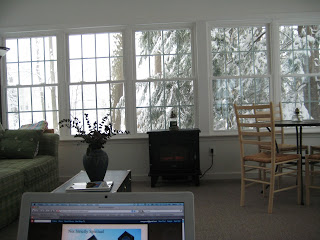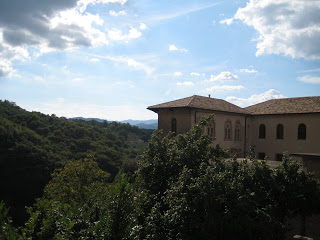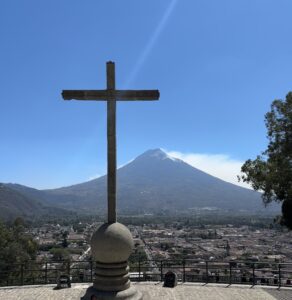
by Mary | Feb 28, 2011 | Food
In the last year or so I have become very much aware, perhaps painfully aware, of the things that hinder my spiritual life. And, as I mentioned in my last post about my laundry stand-off, many of those things appear minor on the surface. Taken individually, any one of them would be considered fairly insignificant, but when I look at them all together, I start to get the feeling that maybe I’m overlooking something much bigger, something that lies at the heart of all those little obstacles I throw in my own way. (more…)
by Mary | Feb 25, 2011 | Uncategorized

Here’s the view from my “office” today. The snow may be coming down like crazy, but the temperatures are warm enough that I can get the three-season sun porch to a comfortable temp with an electric “stove” and space heater. Not a bad way to have to work. (And the kids are in the basement, apparently unaware of my temporary relocation.)
The view above is from my workspace on the couch. Below are some shots of the scenery.




by Mary | Feb 23, 2011 | Uncategorized
 My post from OSV Daily Take today:
My post from OSV Daily Take today:
My spiritual reading this morning was taken from none other than U2 frontman Bono. I wanted to pull one great quote for you to ponder, but, to be honest, the whole interview was one great quote — about God, about grace, about Jesus as Messiah. I sat at my kitchen table and read it aloud to my 14-year-old son. It was that good.
Don’t believe me? Here are a few select quotes from Bono: In Conversation With Michka Assayas, which is being excerpted over on a Christian apologetics site called The Poached Egg.
Bono on Scripture, and God as love personified:
Bono: My understanding of the Scriptures has been made simple by the person of Christ. Christ teaches that God is love. What does that mean? What it means for me: a study of the life of Christ. Love here describes itself as a child born in straw poverty, the most vulnerable situation of all, without honor. I don’t let my religious world get too complicated. I just kind of go: Well, I think I know what God is. God is love, and as much as I respond [sighs] in allowing myself to be transformed by that love and acting in that love, that’s my religion. Where things get complicated for me, is when I try to live this love. Now that’s not so easy.
Bono on grace over karma:
Bono: You see, at the center of all religions is the idea of Karma. You know, what you put out comes back to you: an eye for an eye, a tooth for a tooth, or in physics; in physical laws every action is met by an equal or an opposite one. It’s clear to me that Karma is at the very heart of the universe. I’m absolutely sure of it. And yet, along comes this idea called Grace to upend all that “as you reap, so you will sow” stuff. Grace defies reason and logic. Love interrupts, if you like, the consequences of your actions, which in my case is very good news indeed, because I’ve done a lot of stupid stuff.
Assayas: I’d be interested to hear that.
Bono: That’s between me and God. But I’d be in big trouble if Karma was going to finally be my judge. I’d be in deep s—. It doesn’t excuse my mistakes, but I’m holding out for Grace. I’m holding out that Jesus took my sins onto the Cross, because I know who I am, and I hope I don’t have to depend on my own religiosity.
Bono on Jesus as Messiah:
Assayas: The Son of God who takes away the sins of the world. I wish I could believe in that.
Bono: But I love the idea of the Sacrificial Lamb. I love the idea that God says: Look, you cretins, there are certain results to the way we are, to selfishness, and there’s a mortality as part of your very sinful nature, and, let’s face it, you’re not living a very good life, are you? There are consequences to actions. The point of the death of Christ is that Christ took on the sins of the world, so that what we put out did not come back to us, and that our sinful nature does not reap the obvious death. That’s the point. It should keep us humbled . It’s not our own good works that get us through the gates of heaven.
Assayas: That’s a great idea, no denying it. Such great hope is wonderful, even though it’s close to lunacy, in my view. Christ has his rank among the world’s great thinkers. But Son of God, isn’t that farfetched?
Bono: No, it’s not farfetched to me. Look, the secular response to the Christ story always goes like this: he was a great prophet, obviously a very interesting guy, had a lot to say along the lines of other great prophets, be they Elijah, Muhammad, Buddha, or Confucius. But actually Christ doesn’t allow you that. He doesn’t let you off that hook. Christ says: No. I’m not saying I’m a teacher, don’t call me teacher. I’m not saying I’m a prophet. I’m saying: “I’m the Messiah.” I’m saying: “I am God incarnate.” And people say: No, no, please, just be a prophet. A prophet, we can take. You’re a bit eccentric. We’ve had John the Baptist eating locusts and wild honey, we can handle that. But don’t mention the “M” word! Because, you know, we’re gonna have to crucify you. And he goes: No, no. I know you’re expecting me to come back with an army, and set you free from these creeps, but actually I am the Messiah. At this point, everyone starts staring at their shoes, and says: Oh, my God, he’s gonna keep saying this. So what you’re left with is: either Christ was who He said He was the Messiah or a complete nutcase. I mean, we’re talking nutcase on the level of Charles Manson. This man was like some of the people we’ve been talking about earlier. This man was strapping himself to a bomb, and had “King of the Jews” on his head, and, as they were putting him up on the Cross, was going: OK, martyrdom, here we go. Bring on the pain! I can take it. I’m not joking here. The idea that the entire course of civilization for over half of the globe could have its fate changed and turned upside-down by a nutcase, for me, that’s farfetched.
Go read more excerpts (including his comments about meeting Pope John Paul II) HERE. To have a rock star of this caliber talking about his relationship with Jesus Christ is so powerful. It’s certainly not the first time he’s done it, but I think it’s the most honest and detailed and significant of his comments on his Christian faith. Regardless of whether you like his music or his specific take on Christianity, this is huge.

by Mary | Feb 10, 2011 | Travel
When I was in Italy this past September, the final full day of the trip included a daylong visit to the Monastery of St. Benedict and the Monastery of St. Scholastica in Subiaco, just an hour’s bus ride from Rome. It was a beautiful day, filled with awesome sights and spiritual inspiration. So today, on the Feast of St. Scholastica, I thought I’d share some photos from the monastery that bears her name. (more…)
by Mary | Feb 4, 2011 | Books
This is my post from OSV Daily Take today. I thought it was too important not to share here as well…
By Mary DeTurris Poust
About three years ago, I started giving workshops entitled: “The Lost Generation: Reaching Out to Adult Catholics Disconnected from the Faith.” The workshop grew out of emails, letters and in-person pleas I received in response to my book The Complete Idiot’s Guide to the Catholic Catechism. People kept coming up to me, telling me they’d never learned what was in my book, and sharing the stories of why and how they fell away from the faith of their birth.
And so I began to explore what I labeled the “lost generation,” those Catholics — like myself — who came of age immediately after Vatican II and missed out on some of the basic teachings of the Church. (HERE is a story I did on this subject in the July 6, 2008 issue of OSV.)
As I say in my workshop, I was raised in the “era of the collage.” The intentions were good but the lessons weren’t always solid. Fortunately, I had a mom who was determined to make sure I got a good grounding in my faith no matter what was — or was not — being taught in CCD class. Not everyone was so lucky.
So, it was with great interest that I read stories about a recent conference at Fordham University that was focusing on a “lost generation,” only the generation in question is the 20-something generation of today. The follow-up stories shared the good news that this generation isn’t really lost at all.
Here’s a quote from CNS:
“Catholic young adults aren’t as attached to the church as their counterparts from the 1940s and 1950s, but they are hardly a lost generation and have not abandoned the faith, according to speakers at a two-day forum at Jesuit-run Fordham University.”
Notice who they’re looking at: Catholic young adults and their “counterparts” from the 1940s and 50s. What about their counterparts from the 1960s and 70s? Their parents? That is the original lost generation, my generation, the folks who were lost along the way as the Church changed the methods and content of catechesis.
I have heard from these people. They are hungry for a closer connection to their Church. They are pained by their inability to get the basics they need so they can re-enter in a meaningful way. They feel lost, abandoned, let down. And now we can see why. They are completely missing from the discussions on how to reach adult Catholics, still lost between their own parents and their children.
As I have said in workshops from the Archdiocese of Denver to the Archdiocese of Newark, if we do not recognize this truly lost generation of Catholics, we will not be able to recapture the not-lost, but drifting generation that’s coming along behind them. And the generations after that.
I see it in my own parish. I hear about every time I go out and speak on this topic. Here’s a snippet from a post I wrote on this subject two years ago after giving a two-hour workshop in the Diocese of Albany:
How do we reach out to adult Catholics who feel cut off from their faith? How do we coax them back into the fold in unintimidating ways that will make them feel part of a faith community? There are no easy answers, but it absolutely has to begin with community first and catechesis second.
We can’t expect people to show up for classes or meetings if they don’t feel like they are part of something, if they have no stake in their parish or church. We have to give them ownership, welcome them, talk to them, answer their questions, and drop our preconceived notions about why they may or may not attend Mass, why they send their kids to faith formation but don’t practice the faith at home. As I say in my talk, if they have any connection to the church at all — no matter how tenuous — it’s a sign that they are within our grasp and may be hungry for something more.
…We need to reach the parents through the kids, educate the parents by involving them in the faith education of their children, connect with the parents not through mandatory meetings but through acts of solidarity and subtle, even hidden, catechesis. In other words, by making our faith real to them through our words and actions.
…We need to show people that their spiritual community can be a refuge in the midst of the chaos. But that means that parishes need to be truly welcoming, truly community-minded, truly open to new people and new ideas…We cannot demand discipleship. Instead we must extend an invitation that is so meaningful and so enticing that it simply cannot be refused.
There is a lost generation, a group of middle-aged Catholics who were left behind in the 1960s and 70s and remain so completely lost to us that no one even seems to notice they’re gone. If we don’t find a way to bring them back into the fold, we are in danger of losing the generations that follow. Then there won’t be a lost generation but two or three lost generations.







